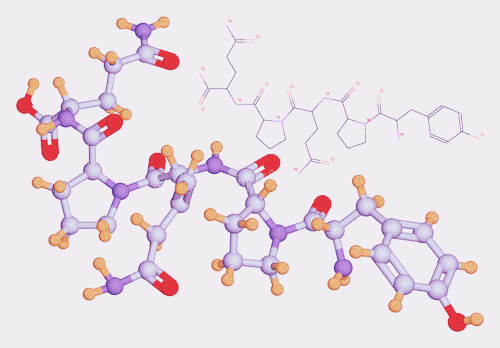1. Introduction of peptides Cosmetic peptide is a degraded small molecule collagen containing amino acid groups, generally composed of 2-10 amino acids. Peptide is also a component that originally exists in the human body, and it is a chain structure composed of amino acids. Melanotan 2, which we are familiar with, is a cosmetic peptide.
Peptides are composed of amino acids linked by peptide chains, but each peptide can be composed of many different amino acids. Two amino acids are called dipeptides, three amino acids are called tripeptides, and so on. The three-peptide, five-peptide, and even nine-peptide that are often heard at present belong to the oligopeptide chain. Each oligopeptide chain has a different effect. Usually, peptides with less than 10 amino acids are called oligopeptides, those with more amino acids are called polypeptides, and those with more than 50 amino acids are called proteins.
Due to the different varieties of amino acids contained, there are also different varieties of dipeptide and tripeptide, so there are "peptides" with various functions and various names. Peptides are involved in the human body's hormones, nerves, cell growth and reproduction. Its importance lies in adjusting the physiological functions of various systems and cells in the body, activating related enzyme systems in the body, promoting the permeability of the intermediate metabolic membrane, or by controlling DNA transcription. Or affect specific protein synthesis, and eventually produce specific physiological effects.

2. The cosmetic effect of peptides in cosmetics The biological activity of peptides depends on its amino acid composition and sequence. Almost all physiological processes in the human body are regulated by polypeptides or proteins composed of specific amino acid sequences. Therefore, bioactive peptides have become a new direction and idea for the research and development and application of cosmetics, and their functions are becoming more and more subdivided, such as: anti-aging, anti-allergy, repair, anti-oxidation, anti-edema, promoting hair regeneration, inhibiting melanin production, breast enhancement , weight loss, etc.
The skin is the natural barrier of the human body against external environmental aggression, and has a certain protective effect against external stimuli, which is due to the protective effect of the dense stratum corneum of the skin. However, it also blocks the nutrients of cosmetics on the surface of the skin. Nutrients need to penetrate through the cell membrane of the stratum corneum to enter the dermis. Only a small amount of macromolecules and fat-soluble substances can be absorbed through pores and sweat pores. Therefore, most of the cosmetics we usually use only stay on the surface of the skin, while the biologically active beauty peptides can easily pass through the stratum corneum gap and enter the dermis to play a role.
At first, peptides were directly used in products by some European and American cosmeceuticals. The mechanism of action is similar to that of proteins. It can promote the proliferation of collagen, elastic fibers, polysaccharides and hyaluronic acid, increase skin moisture content, increase skin thickness and reduce fineness. pattern. Due to the different types of amino acids contained, they can play different roles and meet the needs of different functions of the skin.



